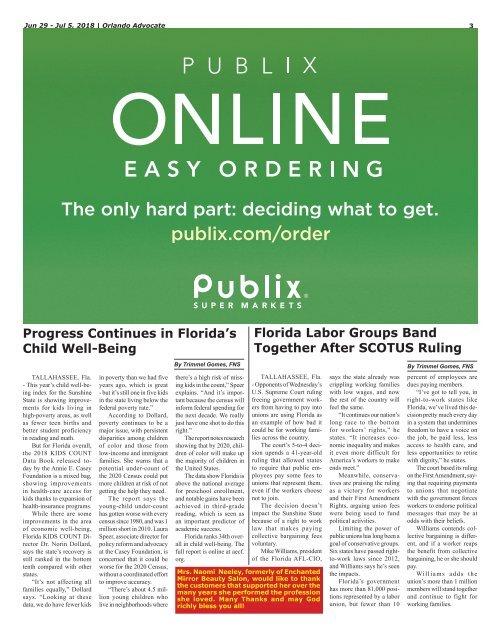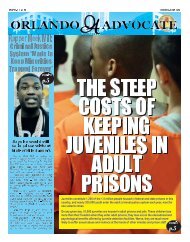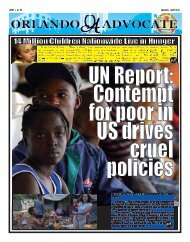2018-06-29
Create successful ePaper yourself
Turn your PDF publications into a flip-book with our unique Google optimized e-Paper software.
Jun <strong>29</strong> - Jul 5, <strong>2018</strong> | Orlando Advocate<br />
3<br />
The only hard part: deciding what to get.<br />
publix.com/order<br />
Progress Continues in Florida’s<br />
Child Well-Being<br />
Florida Labor Groups Band<br />
Together After SCOTUS Ruling<br />
By Trimmel Gomes, FNS<br />
By Trimmel Gomes, FNS<br />
TALLAHASSEE, Fla.<br />
- This year’s child well-being<br />
index for the Sunshine<br />
State is showing improvements<br />
for kids living in<br />
high-poverty areas, as well<br />
as fewer teen births and<br />
better student proficiency<br />
in reading and math.<br />
But for Florida overall,<br />
the <strong>2018</strong> KIDS COUNT<br />
Data Book released today<br />
by the Annie E. Casey<br />
Foundation is a mixed bag,<br />
showing improvements<br />
in health-care access for<br />
kids thanks to expansion of<br />
health-insurance programs.<br />
While there are some<br />
improvements in the area<br />
of economic well-being,<br />
Florida KIDS COUNT Director<br />
Dr. Norin Dollard,<br />
says the state’s recovery is<br />
still ranked in the bottom<br />
tenth compared with other<br />
states.<br />
“It’s not affecting all<br />
families equally,” Dollard<br />
says. “Looking at these<br />
data, we do have fewer kids<br />
in poverty than we had five<br />
years ago, which is great<br />
- but it’s still one in five kids<br />
in the state living below the<br />
federal poverty rate.”<br />
According to Dollard,<br />
poverty continues to be a<br />
major issue, with persistent<br />
disparities among children<br />
of color and those from<br />
low-income and immigrant<br />
families. She warns that a<br />
potential under-count of<br />
the 2020 Census could put<br />
more children at risk of not<br />
getting the help they need.<br />
The report says the<br />
young-child under-count<br />
has gotten worse with every<br />
census since 1980, and was 1<br />
million short in 2010. Laura<br />
Speer, associate director for<br />
policy reform and advocacy<br />
at the Casey Foundation, is<br />
concerned that it could be<br />
worse for the 2020 Census,<br />
without a coordinated effort<br />
to improve accuracy.<br />
“There’s about 4.5 million<br />
young children who<br />
live in neighborhoods where<br />
there’s a high risk of missing<br />
kids in the count,” Speer<br />
explains. “And it’s important<br />
because the census will<br />
inform federal spending for<br />
the next decade. We really<br />
just have one shot to do this<br />
right.”<br />
The report notes research<br />
showing that by 2020, children<br />
of color will make up<br />
the majority of children in<br />
the United States.<br />
The data show Florida is<br />
above the national average<br />
for preschool enrollment,<br />
and notable gains have been<br />
achieved in third-grade<br />
reading, which is seen as<br />
an important predictor of<br />
academic success.<br />
Florida ranks 34th overall<br />
in child well-being. The<br />
full report is online at aecf.<br />
org.<br />
TALLAHASSEE, Fla.<br />
- Opponents of Wednesday’s<br />
U.S. Supreme Court ruling<br />
freeing government workers<br />
from having to pay into<br />
unions are using Florida as<br />
an example of how bad it<br />
could be for working families<br />
across the country.<br />
The court’s 5-to-4 decision<br />
upends a 41-year-old<br />
ruling that allowed states<br />
to require that public employees<br />
pay some fees to<br />
unions that represent them,<br />
even if the workers choose<br />
not to join.<br />
The decision doesn’t<br />
impact the Sunshine State<br />
because of a right to work<br />
law that makes paying<br />
collective bargaining fees<br />
voluntary.<br />
Mike Williams, president<br />
of the Florida AFL-CIO,<br />
Mrs. Naomi Neeley, formerly of Enchanted<br />
Mirror Beauty Salon, would like to thank<br />
the customers that supported her over the<br />
many years she performed the profession<br />
she loved. Many Thanks and may God<br />
richly bless you all!<br />
says the state already was<br />
crippling working families<br />
with low wages, and now<br />
the rest of the country will<br />
feel the same.<br />
“It continues our nation’s<br />
long race to the bottom<br />
for workers’ rights,” he<br />
states. “It increases economic<br />
inequality and makes<br />
it even more difficult for<br />
America’s workers to make<br />
ends meet.”<br />
Meanwhile, conservatives<br />
are praising the ruling<br />
as a victory for workers<br />
and their First Amendment<br />
Rights, arguing union fees<br />
were being used to fund<br />
political activities.<br />
Limiting the power of<br />
public unions has long been a<br />
goal of conservative groups.<br />
Six states have passed rightto-work<br />
laws since 2012,<br />
and Williams says he’s seen<br />
the impacts.<br />
Florida’s government<br />
has more than 81,000 positions<br />
represented by a labor<br />
union, but fewer than 10<br />
percent of employees are<br />
dues paying members.<br />
“I’ve got to tell you, in<br />
right-to-work states like<br />
Florida, we’ve lived this decision<br />
pretty much every day<br />
in a system that undermines<br />
freedom to have a voice on<br />
the job, be paid less, less<br />
access to health care, and<br />
less opportunities to retire<br />
with dignity,” he states.<br />
The court based its ruling<br />
on the First Amendment, saying<br />
that requiring payments<br />
to unions that negotiate<br />
with the government forces<br />
workers to endorse political<br />
messages that may be at<br />
odds with their beliefs.<br />
Williams contends collective<br />
bargaining is different,<br />
and if a worker reaps<br />
the benefit from collective<br />
bargaining, he or she should<br />
pay.<br />
Williams adds the<br />
union’s more than 1 million<br />
members will stand together<br />
and continue to fight for<br />
working families.













